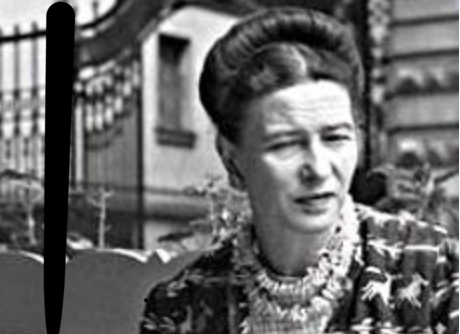Feminist Theorist Thursdays: Simone de Beauvoir

Photo by Archivo del diario Clarín via Wikimedia Commons
“One is not born, but rather becomes, a woman.” This provocative assertion from Simone de Beauvoir’s acclaimed book, “The Second Sex,” helped destroy the notion that women are born feminine. Though she spent most of her life claiming she was not a feminist because she believed the label was antithetical to her socialist beliefs, Beauvoir’s theories had a profound impact on feminist thought.
In 1926, Beauvoir enrolled at the University of Paris where she studied philosophy and met her lifelong partner, Jean-Paul Sartre. Though both were important figures in post-WWII existentialist though, Sartre is more often associated with existential philosophy. Beauvoir is better known for her contributions to feminist theory, specifically feminist existentialism.
Her magnum opus, “The Second Sex,” describes the essential tenets of feminist existentialism. Beauvoir’s underlying claim is that women only exist in society as men’s “Other.”
To Beauvoir, all of human existence is divided between “transcendence” and “immanence.” Transcendence is the ability for an individual to go beyond their own limits and actively pursue projects such as writing or exploring, while immanence is remaining in the same circumstance. She argues that only men have been able to express the former, whereas women are forced to live an uncreative life of immanence.
The first major volume in the book investigates “Facts and Myths” about women from many different perspectives, claiming that women share unique experiences apart from men like menstruation and pregnancy. Because of this, men see women as foreign — the “Other.”
Beauvoir explains how these “facts” about women created a myth of the “Eternal Feminine” which depicts women as essentially passive and nurturing. This myth is full of double standards that makes it impossible for women to fulfill society’s expectations. For example, Beauvoir points out the contradictory stereotypes of women as mothers/birthers, like the Virgin Mary, or as symbols of death, like “La Llorona” who drowned her children in a river after being domestically abused by her husband.
The second half of the book begins with the provocative assertion that “one is not born, but rather becomes, a woman.” In this section, Beauvoir expands on her existential philosophy, asserting that “femininity” is only a product of society that causes women to become subject to men.
Beauvoir believes that men will never fully be able to oppress women because each individual — regardless of sex — has a radical freedom. Instead, she believes that all individuals, including women, have the possibility of free will even if they are objectified and alienated in society.
Beauvoir concludes the book with some concrete actions women must take to ever achieve existential liberation. First, they must be able to participate in their own creative projects despite the fear of rejection and uncertainty. Additionally, women should have access to jobs, contraception, education and any other service that leads to individual progress.
This last part of the book was the foundation for second wave feminism. Her philosophical ideas mobilized many women in the late 20th century to demand the right to jobs, abortion, universal child care and equality in marriage.
Though Beauvoir made huge strides for women, her work is criticized by contemporary feminist philosophers such as Judith Butler. In her essay, “Sex and Gender in Simone de Beauvoir’s Second Sex,” Butler asserts that the main problem with Beauvoir’s work is that it distinguishes between between sex and gender without considering that gender only manifests to uphold structures of power.
Butler looks beyond the metaphysical arguments about sex and gender and focuses on the identity politics associated with the terms. Butler asserts that Beauvoir upholds identity politics, which is bad for two reasons: first, it presupposes an identity based on a common shared experience which will always leave out certain classes, races, sexualities, and other minority groups. Second, the descriptive nature of identity politics assumes certain claims about what a “good” or “authentic” woman is.
Despite these criticisms, Beauvoir remains an important figure for feminism. She spent most of the 1970s working with the French Women’s Liberation Movement and eventually declared herself a feminist in 1972. Beauvoir’s activism and authorship influenced women then and continues to influence feminism today.




